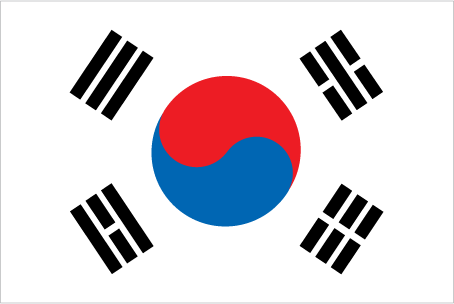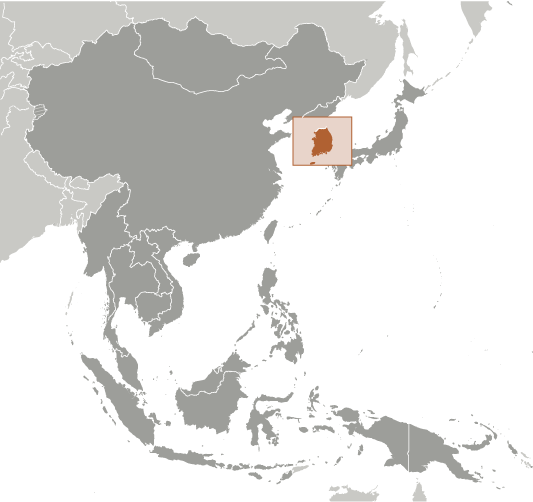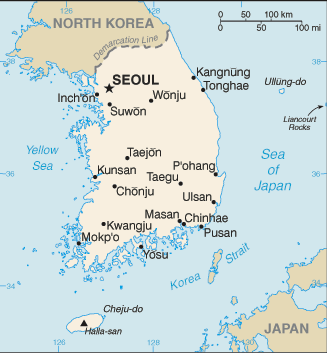An independent Korean state or collection of states has existed almost continuously for several millennia. Between its initial unification in the 7th century - from three predecessor Korean states - until the 20th century, Korea existed as a single independent country. In 1905, following the Russo-Japanese War, Korea became a protectorate of imperial Japan, and in 1910 it was annexed as a colony. Korea regained its independence following Japan's surrender to the United States in 1945. After World War II, a Republic of Korea (ROK) was set up in the southern half of the Korean Peninsula while a Communist-style government was installed in the north (the DPRK). During the Korean War (1950-53), US troops and UN forces fought alongside soldiers from the ROK to defend South Korea from DPRK attacks supported by China and the Soviet Union. An armistice was signed in 1953, splitting the peninsula along a demilitarized zone at about the 38th parallel. Thereafter, South Korea achieved rapid economic growth with per capita income rising to roughly 14 times the level of North Korea. In 1993, KIM Young-sam became South Korea's first civilian president following 32 years of military rule. South Korea today is a fully functioning modern democracy. In June 2000, a historic first North-South summit took place between the South's President KIM Dae-jung and the North's leader KIM Jong Il. In October 2007, a second North-South summit took place between the South's President ROH Moo-hyun and the North Korean leader. Harsh rhetoric and unwillingness by North Korea to engage with President LEE Myung-bak following his February 2008 inauguration has strained inter-Korean relations.
Country Name
Conventional long form:Republic of Korea
Conventional short form:South Korea
Local long form:Taehan-min'guk
Local short form:Han'guk
abbreviation: ROK
Government Type
republic
Capital
Name:Seoul
Geographic coordinates: 37 33 N, 126 59 E
Time difference:UTC+9 (14 hours ahead of Washington, DC during Standard Time)
Administrative divisions
9 provinces (do, singular and plural) and 7 metropolitan cities (gwangyoksi, singular and plural)
provinces: Cheju-do, Cholla-bukto (North Cholla), Cholla-namdo (South Cholla), Ch'ungch'ong-bukto (North Ch'ungch'ong), Ch'ungch'ong-namdo (South Ch'ungch'ong), Kangwon-do, Kyonggi-do, Kyongsang-bukto (North Kyongsang), Kyongsang-namdo (South Kyongsang)
metropolitan cities: Inch'on-gwangyoksi, Kwangju-gwangyoksi, Pusan-gwangyoksi, Soul-t'ukpyolsi, Taegu-gwangyoksi, Taejon-gwangyoksi, Ulsan-gwangyoksi
Independence
15 August 1945 (from Japan)
National Holiday
Liberation Day, 15 August (1945)
Constitution
17 July 1948; note - amended or rewritten many times; current constitution approved on 29 October 1987
Legal system
combines elements of continental European civil law systems, Anglo-American law, and Chinese classical thought; has not accepted compulsory ICJ jurisdiction
Suffrage
19 years of age; universal
Executive branch
Chief of state:President LEE Myung-bak (since 25 February 2008)
Head of government:Prime Minister CHUNG Un-chan (since 30 September 2009)
Cabinet:State Council appointed by the president on the prime minister's recommendation
(For more information visit the World Leaders website)
Elections:president elected by popular vote for a single five-year term; election last held on 19 December 2007 (next to be held in December 2012); prime minister appointed by president with consent of National Assembly
Election results:LEE Myung-bak elected president on 19 December 2007; percent of vote - LEE Myung-bak (GNP) 48.7%; CHUNG Dong-young (UNDP) 26.1%); LEE Hoi-chang (independent) 15.1; others 10.1%
Legislative branch
unicameral National Assembly or Kukhoe (299 seats; 245 members elected in single-seat constituencies, 54 elected by proportional representation; members serve four-year terms)
Elections:last held on 9 April 2008 (next to be held in April 2012)
Election results:percent of vote by party - NA; seats by party - GNP 172, UDP 83, LFP 20, PPA 8, DLP 5, RKP 1, independents 9
Judicial branch
Supreme Court (justices appointed by the president with consent of National Assembly); Constitutional Court (justices appointed by the president based partly on nominations by National Assembly and Chief Justice of the court)
Political Parties and Leaders
Democratic Party or DP [CHUNG Sye-kyun] (formerly the United Democratic Party or UDP); Democratic Labor Party or DLP [KANG Ki-kap]; Grand National Party or GNP [CHUNG Mong-joon]; Liberty Forward Party or LFP [LEE Hoi-chang]; New Progressive Party or NPP [ROH Hoe-chan]; Pro-Park Alliance or PPA [SUH Choung-won]; Renewal Korea Party or RKP [SONG Yong-o]
Political pressure groups and leaders
Federation of Korean Industries; Federation of Korean Trade Unions; Korean Confederation of Trade Unions; Korean National Council of Churches; Korean Traders Association; Korean Veterans' Association; National Council of Labor Unions; National Democratic Alliance of Korea; National Federation of Farmers' Associations; National Federation of Student Associations
International organization participation
ADB, AfDB (nonregional member), APEC, APT, ARF, ASEAN (dialogue partner), Australia Group, BIS, CD, CICA, CP, EAS, EBRD, FAO, FATF, G-20, IADB, IAEA, IBRD, ICAO, ICC, ICCt, ICRM, IDA, IEA, IFAD, IFC, IFRCS, IHO, ILO, IMF, IMO, IMSO, Interpol, IOC, IOM, IPU, ISO, ITSO, ITU, ITUC, LAIA, MIGA, MINURSO, NEA, NSG, OAS (observer), OECD, OPCW, OSCE (partner), Paris Club (associate), PCA, PIF (partner), SAARC (observer), UN, UNCTAD, UNESCO, UNHCR, UNIDO, UNIFIL, UNMIL, UNMIS, UNMOGIP, UNOCI, UNWTO, UPU, WCO, WFTU, WHO, WIPO, WMO, WTO, ZC
Diplomatic representation in the US
Chief of mission: Ambassador HAN Duck-soo
Chancery:2450 Massachusetts Avenue NW, Washington, DC 20008
Telephone:[1] (202) 939-5600
FAX:[1] (202) 387-0205
Consulate(s) general:Agana (Guam), Atlanta, Boston, Chicago, Honolulu, Houston, Los Angeles, New York, San Francisco, Seattle
Diplomatic representation from the US
Chief of mission:Ambassador Kathleen STEPHENS
Embassy:32 Sejongno, Jongno-gu, Seoul 110-710
Mailing address:US Embassy Seoul, APO AP 96205-5550
Telephone:[82] (2) 397-4114
FAX:[82] (2) 738-8845
Flag description
white with a red (top) and blue yin-yang symbol in the center; there is a different black trigram from the ancient I Ching (Book of Changes) in each corner of the white field










